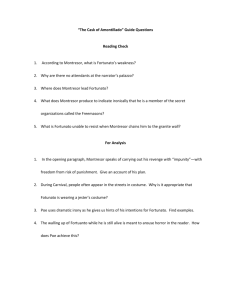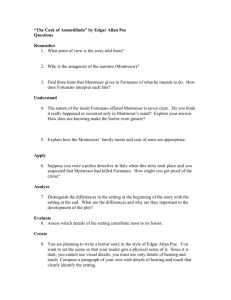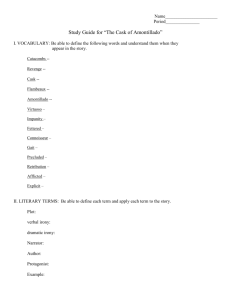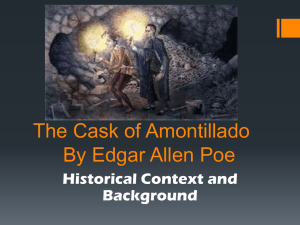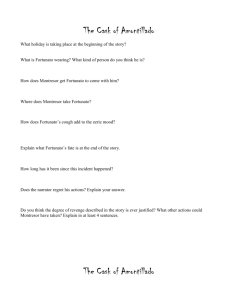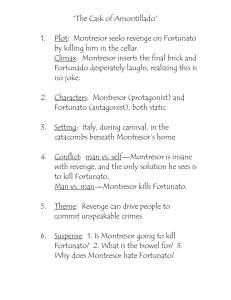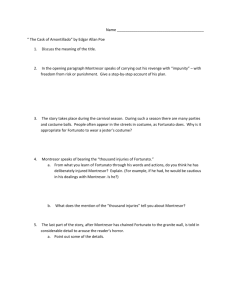The Cask of Amontillado by E
advertisement
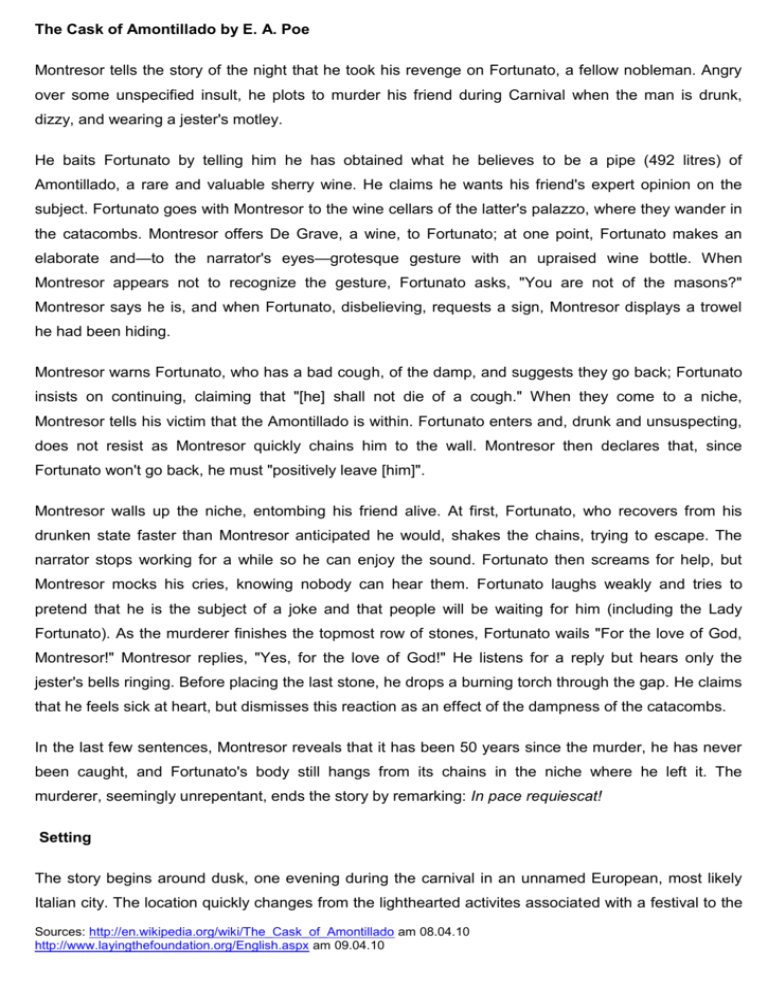
The Cask of Amontillado by E. A. Poe Montresor tells the story of the night that he took his revenge on Fortunato, a fellow nobleman. Angry over some unspecified insult, he plots to murder his friend during Carnival when the man is drunk, dizzy, and wearing a jester's motley. He baits Fortunato by telling him he has obtained what he believes to be a pipe (492 litres) of Amontillado, a rare and valuable sherry wine. He claims he wants his friend's expert opinion on the subject. Fortunato goes with Montresor to the wine cellars of the latter's palazzo, where they wander in the catacombs. Montresor offers De Grave, a wine, to Fortunato; at one point, Fortunato makes an elaborate and—to the narrator's eyes—grotesque gesture with an upraised wine bottle. When Montresor appears not to recognize the gesture, Fortunato asks, "You are not of the masons?" Montresor says he is, and when Fortunato, disbelieving, requests a sign, Montresor displays a trowel he had been hiding. Montresor warns Fortunato, who has a bad cough, of the damp, and suggests they go back; Fortunato insists on continuing, claiming that "[he] shall not die of a cough." When they come to a niche, Montresor tells his victim that the Amontillado is within. Fortunato enters and, drunk and unsuspecting, does not resist as Montresor quickly chains him to the wall. Montresor then declares that, since Fortunato won't go back, he must "positively leave [him]". Montresor walls up the niche, entombing his friend alive. At first, Fortunato, who recovers from his drunken state faster than Montresor anticipated he would, shakes the chains, trying to escape. The narrator stops working for a while so he can enjoy the sound. Fortunato then screams for help, but Montresor mocks his cries, knowing nobody can hear them. Fortunato laughs weakly and tries to pretend that he is the subject of a joke and that people will be waiting for him (including the Lady Fortunato). As the murderer finishes the topmost row of stones, Fortunato wails "For the love of God, Montresor!" Montresor replies, "Yes, for the love of God!" He listens for a reply but hears only the jester's bells ringing. Before placing the last stone, he drops a burning torch through the gap. He claims that he feels sick at heart, but dismisses this reaction as an effect of the dampness of the catacombs. In the last few sentences, Montresor reveals that it has been 50 years since the murder, he has never been caught, and Fortunato's body still hangs from its chains in the niche where he left it. The murderer, seemingly unrepentant, ends the story by remarking: In pace requiescat! Setting The story begins around dusk, one evening during the carnival in an unnamed European, most likely Italian city. The location quickly changes from the lighthearted activites associated with a festival to the Sources: http://en.wikipedia.org/wiki/The_Cask_of_Amontillado am 08.04.10 http://www.layingthefoundation.org/English.aspx am 09.04.10 damp, dark catacombs under Montressor's palazzo which helps to establish the ghostly atmosphere of the story. Characters Montresor, a deranged man who seeks revenge. Fortunato, a haughty wine connoisseur against whom Montresor seeks revenge. Narrative Technique (Point of View) First-Person Unreliable. Poe writes this story from the unreliable, first person perspective of Montresor who vows revenge against Fortunato. Poe does not intend for the reader to sympathize with Montresor because he has been wronged by Fortunato, but rather to judge him. Telling the story from Montresor's point of view, intensifies the effect of moral shock and horror. Once again, the reader is invited (as was the case in "The Tell-Tale Heart") to look into the inner workings of a sinister mind. Task: Find quotes that support the Montresor’s unreliability! _______________________________________________________________________________ _______________________________________________________________________________ _______________________________________________________________________________ _______________________________________________________________________________ _______________________________________________________________________________ _______________________________________________________________________________ (Mode of Presentation) Scenic. As with many short stories the author focuses on one event in rather great detail. (Means of Presentation) “Direct Speech.” Poe presents his story in parts as dialogues. Sources: http://en.wikipedia.org/wiki/The_Cask_of_Amontillado am 08.04.10 http://www.layingthefoundation.org/English.aspx am 09.04.10 Themes Revenge Fortunato had committed many offenses against Montresor, the last one an insult, according to Montresor. Deception To lure Fortunato into the catacombs, Montresor deceives Fortunato, telling him he wants to taste some wine to determine whether it is genuine Amontillado. Pride Fortunato readily accepts Montresor's invitation to taste wine and determine whether it is genuine Amontillado, for Fortunato believes himself to be a great wine connoisseur. So proud is he of his ability that he takes on the challenge even though he has a cough and is already somewhat drunk. Use of Irony Throughout the story, Poe uses verbal and dramatic irony to build suspense, foreshadow the ending, and add a touch of macabre humor. Here are some examples irony: The Title: The word cask, meaning wine barrel, is derived from the same root word used to form casket, meaning coffin. Thus, the cask figuratively represents Fortunato’s casket. Fortunato’s Name: The Italian name Fortunato suggests good fortune, luck. However, Fortunato is anything but fortunate; he is going to his death. Fortunato’s Costume: Fortunato dresses as a court jester. His festive outfit contrasts with the ghastly fate that awaits him. From time to time, the bell on his cone-shaped hat jingles–a nice comic touch from Poe. Reference to Masons: Fortunato asks Montresor whether his is a mason, meaning a member of the fraternal order of Freemasonry. Montresor says he is indeed a mason. However, he is using the word to mean a craftsman who builds with stone and mortar (because he will be building Fortunato’s “tomb,” a stone wall.) Poe also uses irony frequently in the dialogue. For example, when Montresor runs into Fortunato, he says, “My dear Fortunato, you are luckily met.” Later, when Montresor pretends to be concerned about Fortunato’s hacking cough as they descend into the vaults, Montresor says, “We will go back. Your health is precious. Your are rich, respected, admired, beloved; you are happy, as I once was. You are a man to be missed.” Fortunato then tells Montresor not to worry: “The cough is a mere nothing; it will not kill me. I will not die of a cough.” To this reply, Montresor says, “True–true.” The reader at this point can almost see a devilish gleam in Montresor’s eyes, for he knows exactly how Fortunato will die.” Later, Montresor opens a bottle of wine and toasts Fortunato: “To your long life,” he says. Sources: http://en.wikipedia.org/wiki/The_Cask_of_Amontillado am 08.04.10 http://www.layingthefoundation.org/English.aspx am 09.04.10 Vocabulary Amontillado dry, amber wine aperture opening catacombs underground burial places circumbscribing encircling, surrounding; fetter chain, bond. flambeau torch; plural, flambeaux. hearken listen carefully. immolate kill a person as a sacrifice imposture deception, fraud. impunity freedom from punishment Médoc red wine from Bordeaux Motley clothes of many colors; jester’s costume Nemo me impune lacessit Latin for No one injures me with impunity. nitre Potassium nitrate. palazzo palace; splendid home. Sources: http://en.wikipedia.org/wiki/The_Cask_of_Amontillado am 08.04.10 http://www.layingthefoundation.org/English.aspx am 09.04.10 pipe cask holding 470 liters puncheon cask holding 318 liters. rapier two-edged sword. rheum watery discharge. roquelaure knee-length, often furtrimmed cloak Sources: http://en.wikipedia.org/wiki/The_Cask_of_Amontillado am 08.04.10 http://www.layingthefoundation.org/English.aspx am 09.04.10 Plot Summary By Michael J. Cummings...© 2005 ... .......It is dusk on a day during the annual carnival celebration in an Italian city. People are eating, drinking, and making merry before the beginning of the 40-day Lenten season. .......But one of the city’s residents, Montresor, is not at all merry. Some time ago, a man named Fortunato–a wine connoisseur–wronged Montresor. In fact, according to Montresor, who is the narrator of the story, Fortunato had committed numerous offenses against him–the last one an intolerable insult. Montresor now plans revenge against Fortunato. A man can stand only so much. .......When he encounters Fortunato on the street, Montresor does not let on that he is angry or means harm to Fortunato, who, in keeping with the carnival festivities, is tipsy. Fortunato is wearing a court jester’s motley outfit and a cone-shaped hat topped with a bell that sometimes rings when he moves his head. After Montresor greets Fortunato and shakes his hand, he tells Fortunato that he recently came into possession of a pipe (126 gallons) of Amontillado, a prized amber dry wine from Spain. However, Montresor says, he is not sure whether the wine is the genuine article. Proud Fortunato, eager to demonstrate his knowledge of wine, immediately agrees to take up the challenge of determining whether the Amontillado is the real thing. .......After they arrive at Montresor’s palazzo (a sumptuous private residence), they descend into the cold, damp vaults where the wine is kept. The vaults are part of a network of catacombs containing the bones of long-dead members of the Montresor family. Several times, Montresor pretends to be concerned about the health of Fortunato, who has a cough, and suggests that they turn back. But Fortunato says, “The cough is a mere nothing; it will not kill me.” .......“True–true,” Montresor answers without outward show of the inner glee he must have been feeling. .......Montresor takes a bottle of Médoc from a shelf, opens it, and gives Fortunato a quaff against the cold. He toasts Fortunato, saying, “To your long life.” Moments later, Montresor presents Fortunato a flagon of De Grâve (an interesting name for a deadly occasion). Fortunato empties it. His mind now swims in groggy joy. .......When they arrive at a wall at the end of their subterranean journey, Montresor quickly claps his drunken companion in chains attached to iron staples in the wall, then turns the key of a padlock attached to the chains. “The Amontillado!” Fortunato says, failing to comprehend his predicament. .......With stone and mortar that had been ensconced nearby, Montresor walls up Fortunato. There are screams from the Sources: http://en.wikipedia.org/wiki/The_Cask_of_Amontillado am 08.04.10 http://www.layingthefoundation.org/English.aspx am 09.04.10 niche, then laughter. Fortunato thinks he is the victim of a joke. Montresor continues to work on the vertical tomb. When he completes his task, he hears the jingling of bells on Fortunato's cap. Then Montresor erects a rampart of bones against the wall. .......Fifty years pass. .......Fortunato remains behind the wall, resting in eternal peace. .. Setting It is early evening in an Italian city during a carnival immediately preceding Lent. Characters .......Montresor, a deranged man who seeks revenge. .......Fortunato, a haughty wine connoisseur against whom Montresor seeks revenge. Type of Work Short story in the horror genre, although careful readers will note that the story contains a great deal of subtle humor. Poe was one of the developers of the short story as a literary genre. He defined a short story as a narrative prose work that (1) is short enough to be read in one sitting, (2) takes place in one locale on a single day, (or even in a few hours), (3) centers on a single line of action, and (4) maintains a single mood. Every word or phrase should contribute to the theme and the mood. Narration (Point of View) First-Person Unreliable. Montresor tells the story in the first person, meaning he uses pronouns such as I, me, my, and so on. He is called an “unreliable” narrator because he is mentally unbalanced; his narration may be untrustworthy. For example, he could have imagined that Fortunato wronged him. Themes Revenge Fortunato had committed many offenses against Montresor, the last one an insult, according to Montresor. Deception To lure Fortunato into the catacombs, Montresor deceives Fortunato, telling him he wants to taste some wine to determine whether it is genuine Amontillado. Pride Fortunato readily accepts Montresor's invitation to taste wine and determine whether it is genuine Amontillado, for Fortunato believes himself to be a great wine connoisseur. So proud is he of his ability that he takes on the challenge even though he has a cough and is already somewhat drunk. Use of Irony Throughout the story, Poe uses verbal and dramatic irony to build suspense, foreshadow the ending, and add a touch of macabre humor. Here are some examples irony: The Title: The word cask, meaning wine barrel, is derived from the same root word used to form casket, meaning coffin. Thus, the cask figuratively represents Fortunato’s casket. Fortunato’s Name: The Italian name Fortunato suggests good fortune, luck. However, Fortunato is anything but fortunate; he is going to his death. Fortunato’s Costume: Fortunato dresses as a court jester. His festive outfit contrasts with the ghastly fate that awaits him. From time to time, the bell on his cone-shaped hat jingles–a nice comic touch from Poe. Reference to Masons: Fortunato asks Montresor whether his is a mason, meaning a member of the fraternal order Sources: http://en.wikipedia.org/wiki/The_Cask_of_Amontillado am 08.04.10 http://www.layingthefoundation.org/English.aspx am 09.04.10 of Freemasonry. Montresor says he is indeed a mason. However, he is using the word to mean a craftsman who builds with stone and mortar (because he will be building Fortunato’s “tomb,” a stone wall.) Poe also uses irony frequently in the dialogue. For example, when Montresor runs into Fortunato, he says, “My dear Fortunato, you are luckily met.” Later, when Montresor pretends to be concerned about Fortunato’s hacking cough as they descend into the vaults, Montresor says, “We will go back. Your health is precious. Your are rich, respected, admired, beloved; you are happy, as I once was. You are a man to be missed.” Fortunato then tells Montresor not to worry: “The cough is a mere nothing; it will not kill me. I will not die of a cough.” To this reply, Montresor says, “True–true.” The reader at this point can almost see a devilish gleam in Montresor’s eyes, for he knows exactly how Fortunato will die.” Later, Montresor opens a bottle of wine and toasts Fortunato: “To your long life,” he says. Vocabulary Words Following is a glossary of difficult words used in the story: Amontillado [uh MON te YAH doh] Dry, amber wine. The word Amontillado is derived from Montilla, the name of a Spanish town. The suffix ado means in the style of. Thus, Amontillado is a wine in the style of the kind made in Montilla, Spain. Aperture Opening. Carnival Festival just before Lent. It is called Mardi Gras in some western countries. The word carnival is derived from the Latin words carne (meat) and vale (farewell). Thus, it literally means “farewell to meat.” During Lent, Roman Catholics do not eat meat on Ash Wednesday and all the Fridays thereafter, until Easter. Catacombs Uunderground burial places. Circumbscribing Encircling, surrounding; tracing a line around. Fetter Shackle, chain, bond. Flambeau Torch; plural, flambeaux. Hearken Listen carefully. Immolate - Kill a person as a sacrifice. Imposture Deception, fraud. Impunity Freedom from punishment; exempt from punishment. Médoc Red wine from the Bordeaux region of France. Motley Apparel of many colors; jester’s costume. Nemo me impune lacessit [NAY moh MAY im POO nay lah CHESS it] Latin for No one injures me with impunity. This sentence appeared on coins of James I of England. Nitre Potassium nitrate. Palazzo Palace; splendid home. Pipe Cask holding 126 gallons. Puncheon Cask holding 84 gallons. Rapier [RAY pe er] Two-edged sword. Rheum [ROOM] Watery discharge. Roquelaure [rok uh LAHR or rok LAHR] Knee-length, often fur-trimmed cloak after Duc de Roquelaure (1656-1738) Sconce Bracket on a wall for holding a candle or a torch. Author Information Edgar Allan Poe was born on January 19, 1809, in Boston. After being orphaned at age two, he was taken into the home of a childless couple–John Allan, a successful businessman in Richmond, Va., and his wife. Allan was believed to be Poe’s godfather. At age six, Poe went to England with the Allans and was enrolled in schools there. After he returned with the Allans to the U.S. in 1820, he studied at private schools, then attended the University of Virginia and the U.S. Military Academy, but did not complete studies at either school. After beginning his literary career as a poet and prose writer, he married his young cousin, Virginia Clemm. He worked for several magazines and joined the staff of the New York Mirror newspaper in 1844. All the while, he was battling a drinking problem. After the Mirror published his poem “The Raven” in January 1845, Poe achieved national and international fame. Besides pioneering the development of the short story, Poe invented the format for the detective story as we know it today. He also was an outstanding literary critic. Despite the acclaim he received, he was never really happy because of his drinking and because of the deaths of several people close to him, including his wife in 1847. He frequently had trouble paying his debts. It is believed that heavy drinking was a contributing cause of his death in Baltimore on October 7, 1849. Sources: http://en.wikipedia.org/wiki/The_Cask_of_Amontillado am 08.04.10 http://www.layingthefoundation.org/English.aspx am 09.04.10
